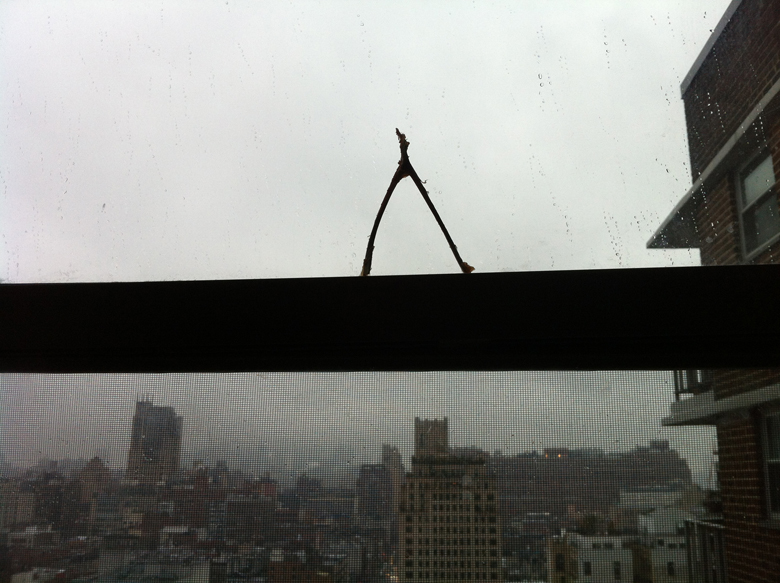
LXVII
Upstream, mon amour.
Burning the bush at both ends.
Pursuit of a-penis.
DANGER SUPEREGO FREEZES BEFORE ROAD.
Where the jist meets the jest.
And the half enchilada.
Texting Matilda, texting Matilda…
You read the Aristotle. I’ll light the fire.
Relationships of ownership
They whisper in the wings
To those condemned to act accordingly
And wait for succeeding kings
And I try to harmonize with songs
The lonesome sparrow sings
There are no kings inside the Gates of Eden
Sang Le môme Zimmerman kan ya makan
Yes-and following Wang Bi’s commentary on Laozi, we find that the “tao continuously brings to life ‘but without taking credit for it,’ and endlessly elevates existents, ‘but without claiming mastery over them,’ because it is ‘ever without desire’ and does not seek to spread over them.’ In that respect, since the tao refrains from any hegemonic expansion…” its power lies in “not obtaining (it aims for nothing), even less in compelling (it forces nothing,) but like the wind it is composed of steadiness, influence, unassignability, and consequently inexhaustibility.” [Jullien, Great Image… pp. 50-53]
At dawn my lover comes to me
And tells me of her dreams
With no attempts to shovel the glimpse
Into the ditch of what each one means…
Dylan ibid.
Whiteness: the myth that keeps on missing.
Relationships of ownerships…
And the pristine breath that produces all things, who owns it?
Mything inaction.
I don’t want french fried potatoes,
Red ripe tomatoes,
I’m never satisfied.
I want the frim-fram sauce with the ausen-fay
With chifafa on the side.
I don’t want pork chops and bacon,
That won’t awaken,
My appetite inside.
I want the frim-fram sauce with the ausen-fay
With chifafa on the side.
Now a fella/girl really got to eat,
And a fella/girl he/she should eat right.
Five will get you ten
I’m gonna feed myself right tonight.
I don’t want fish cakes and rye bread,
You heard what I said.
Waiter, please serve mine fried
I want the frim-fram sauce with the ausen-fay
With chifafa on the side.
(now if you don’t have it, just bring me a check for the water!)
Wrote Redd Evans, oncet in the Rosie the Riveter day. And Nat King Cole, Ella Fitzgerald, and a host of others sung it.
Like Paul Y., those men and women who labored at rescue and recovery down there refer to having worked “on the pile.”
As I was walking that primitive highway…
Qui, c’est compossible.
To dream the compossible dream.
As, not alone, Zhuangzi didoes.
This ground is made of you and me.
zero and the One.
Emptiness in its plenitude.
History will dissolve me. Even as I have been constituted.
Within an infinitely transforming relational field.
That which is overdetermined will meet its iceberg as if by magnetism on the great yet tiny sea.
She was killed in Altoona,
She shouldna stole the money…
Cantó Frank Maya érase una vez.
The centaur will not hold.
Yet close to hand fafar away.
Break and enter or pick and pluck?
With chifafa on the side.
Let the great door swing.
And Muhheakantuck, Hudhudhudson this-way-that-way runson,
And the score plays the conductor whose body moves in response,
And the psalm sings instead of the singer.
And the image remains available.
For reality will always fail the test of truth.
And baby, baybee boogaloo down Broadway or is it up, or canted or dragonspyral?
Strafed, no safer.
That’s reason – enough.
Yet partial, whence whole; crooked, whence straight.
“These distinctions are valuable.”
But are the values distinguishable?
La valeur du billet.

Backseat omelette
Nobody living can ever stop me
This land
Hot off the deep ends
Old lineage, mon amour. No school at all.
One hundred spools of thought.
Jimmy Sabater remembers the night he kept coaxing his bandleader Joe Cuba to play a new number he had in mind. It was 1966 at the Palm Gardens Ballroom in midtown Manhattan, and the house was packed. “It was a black dance,” Jimmy recalls, “de morenos, morenos americanos de Harlem and stuff, you know, they had black dances one night a week there and at some of the other spots. So that night we were playing selections from our new album, We Must Be Doing Something Right, that had just come out, the one with ‘El Pito’ on it, you know, ‘I’ll never go back to Georgia, never go back…’ The place was packed, but when we were playing all those mambos and cha chas, nobody was dancing. So at the end of the first set, I went over to Joe Cuba and said, look, Sonny (that’s his nickname), I have an idea for a tune that I think might get them up. And Joe says, no, no, no, we got to keep on playing the charts from the new album. Then toward the end of the second set, I went on begging him, and said, look, if I’m wrong, we’ll stop and I’ll buy you a double. So finally he said o.k., and I went over to the piano and told Nick Jiménez, play this… Before I even got back to the timbal, the people were out on the floor, going ‘bi-bi, hah! bi-bi, hah!’ I mean mobbed!” As Joe Cuba himself recalls, “suddenly the audience began to dance side-to-side like a wave-type dance, and began to chant ‘she-free, she-free,’ sort of like an African tribal chant and dance.” From “Cha Cha with a Backbeat: Songs and Stories of Latin Boogaloo,”
Black Renaissance 2:2 [Summer 1999] pp. 22-45 by Juan Flores.
Flores goes on to note that the new tune, “Bang Bang” was soon recorded as a single. It charted on Billboard and remained there for ten weeks, unusual indeed for a Latin record. Wanted Dead or Alive [Se busca vivo o muerto], the album on which “Bang Bang” appeared was also a huge hit. Yours truly was then a sophomore in a high school with a significant Latino, mostly Puerto Rican, student body. Dimly, amidst the vast upsurge of incandescently vital rock and R&B tunes that continued, Vesuvius-like, to erupt on the airwaves, and out of ten thousand tinny radio speakers, you realized that “Bang Bang” represented another animal altogether. For the call, response and distinctly non-4/4 play of Jiménez’s montuno added a new but utterly essential manifesto to the supercharged moment – the “Dancing in the Street” moment – and announced to anyone who had ears to hear that the true sixties, the boogaloo sixties, had finally arrived, replete with the message that the dimensions of how one could listen, walk, or dance, had expanded to the potentially limitless. It took “Bang Bang” to teach us that. No one who heard it could ever go back to Georgia, except perhaps in Ray Charles’s mind. And thank you, Juan. 1943-2014. We’re sorry you had to leave this party so soon.

